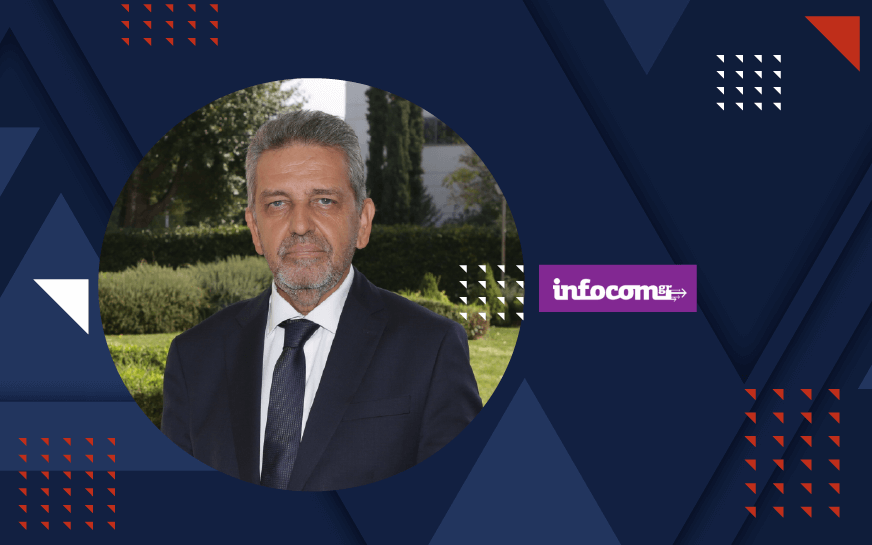The Election Project is a collaboration role model between the Public and the Private Sector

D. Bakakos, SingularLogic: The Election Project is a collaboration role model between the Public and the Private Sector
Interview of Dimitris Bakakos to Christos Kotsakas on Infocom.gr | 12/06/2023
Dimitris Bakakos, General Manager at SingularLogic, discusses the company's project of collecting and presenting the election results since 1981. According to him, this project represents a collaboration role model between the Public and Private sectors, and it is a highly demanding project that evolves continuously via investments in cutting-edge technologies.
Please elaborate on the project undertaken by SingularLogic concerning the Greek National Elections. What were the objectives, and how did you manage to transmit the results in such a short time? Were there any challenges or difficulties that you had to address?
Our company has been collecting and presenting the election results since 1981. Up to now, we have managed 36 electoral contests, handling the entire project's management. Throughout these years, we have consistently invested in new technologies and innovations to enhance transparency and integrity in the electoral process while expediting the announcement of results.
One of these innovations is the Secure Results Transmission (SRT) process directly from the polling centers through next-generation devices. When we first introduced it in 2009, its success represented a significant milestone. Since then, in all subsequent electoral contests, the system has been used on a pilot basis with impressive results, setting new high standards in informing the citizens. In the latest National Elections in May 2023, the use of devices by all Electoral Representatives across the country provided results for both the Party Combinations and Candidates up to 5 hours earlier.
Today, we can proudly speak of the success of our new endeavor, which ensured visible and tangible results throughout the electoral process and facilitated the dissemination of information. Notably, at 10:10 pm on the election day, we presented the results of Party Combination votes from nearly 80% of the country, and one hour after midnight (1 am), we integrated 90% of the votes to Candidates. The main challenge in election projects is to avoid complacency and remain vigilant despite our long-standing involvement. As for challenges and difficulties, they are always present, which is why we are constantly prepared to address any emerging issues.
What are the technologies, software, and hardware used for the project?
The election project entails exceptionally high demands, and we constantly evolve by investing in new technologies. Throughout the years, we have utilized multiple generations of software applications and hardware solutions. Regarding the solution's architecture, we designed and set up a fully controlled network from scratch each time, ensuring its ability to operate independently, even in the face of potential issues during election day. The centerpiece of our infrastructure is SingularLogic's state-of-the-art Data Center.
The design and implementation of the online election portal (ekloges.ypes.gr) have been entirely developed by SingularLogic, utilizing all necessary modern security mechanisms, specialized infrastructures, and content delivery services, which have been proven effective in handling major events. On the night of the elections, the portal experiences high traffic, and many famous Greek and foreign websites utilize it to broadcast the election results.
Concerning the Secure Results Transmission (SRT) system, we employ 21,500 next-generation devices provided to all Electoral Representatives nationwide. Recording the results in the SRT device is exceptionally straightforward via its user-friendly mobile application. The Electoral Representatives transmit the results directly from the polling centers. This ability offers significant advantages, such as rapid results integration, automated results verification during data entry, and a fully secured process with access codes and state-of-the-art security technologies. We use a mobile telephony network to transmit the results and ensure encrypted data transmission to the Ministry of Interior. Lastly, we upgrade the infrastructure and services required for every electoral contest to enhance security and protection against cyber-attacks.
Apart from the upcoming round of this year's Greek National Election, do you plan to leverage this technology and expertise in different use cases?
The election project is a specialized and complex undertaking with increased data volume, implementation time, and information security demands, encompassing extensive technological expertise and specialized technologies. Our long-standing collaboration with the Ministry of Interior is a role model of successful cooperation between the Public and Private sectors.
As you understand, all the above are utilized and applied successfully in implementing the IT projects we undertake for both the Private and the Public sectors. At the same time, they constitute a competitive advantage in large-scale IT projects.
Our extensive experience with elections allows us to approach the project with a long-term perspective. We continuously seek improvement (technological infrastructure upgrades, evolving software apps, and optimizing processes) to achieve better response times without compromising the overall process.
As a prominent technology company looking towards the future, could e-voting be adopted in Greece at some point so that the entire electoral process becomes digital? How far are we technologically from reaching this point?
As an IT company, we closely monitor the technological advancements in electoral processes worldwide, but adopting e-voting is not our decision. Technologically speaking, we are close to achieving it; however, the conditions must be mature for e-voting to occur in a country.
To reach the current digital system of vote counting through the SRT, we ran pilot systems from 2009 to 2023 to create the necessary conditions and implement the system nationwide.





